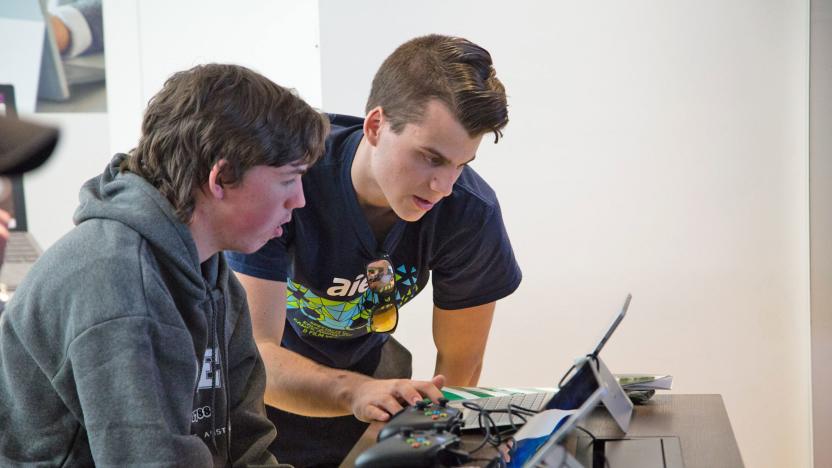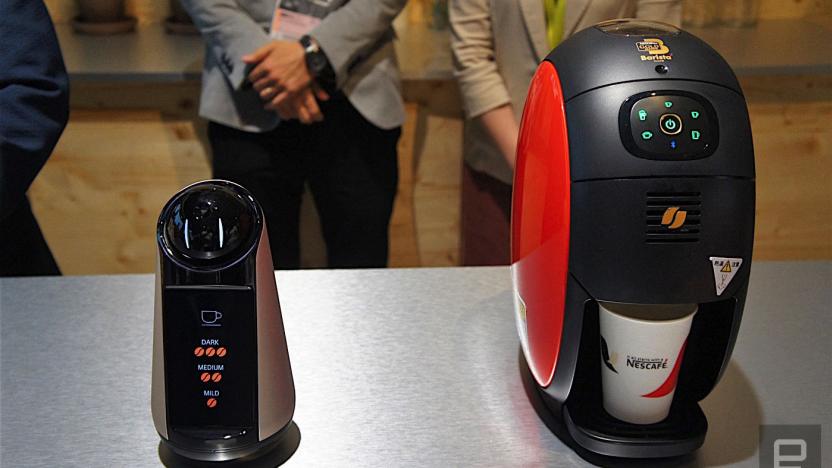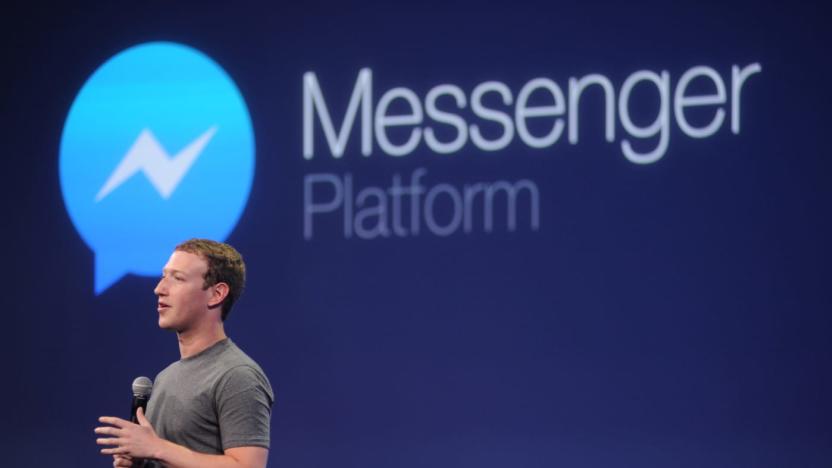code
Latest

Snoopy is your latest coding teacher
Snoopy is taking a break from lying on his doghouse and staring at the sky to help kids learn about computers and coding. As part of Computer Science Education Week (December 4-10), codeSpark Academy and the Peanuts brand are teaming up to release holiday-themed Snoopy Snow Brawl, a cute multi-player coding game that encourages kids to use problem-solving, strategy and algorithms in a snowball fight between Woodstock and his bird buddies, refereed by Snoopy.

Google and Snapchat team up on geofilter coding contest for teens
Snapchat is teaming up with Google's Made With Code initiative to try and encourage teenagers to get into computer science. Teens aged 13 - 18 can build a Snapchat geofilter with Google's Blockly coding system for kids, then submit it to win a trip to the TEDWomen conference in New Orleans and mentoring sessions from Google and Snapchat engineers to create a Lens, an augmented reality filter for your photos. The five finalists' Lenses will be judged at the conference for a chance to go live in the Snapchat app, along with a trip to Los Angeles for a private tour of the Snap, Inc. and Google offices.

Kids can learn to code Xbox and PC games at Microsoft stores
There are a ton of initiatives to help kids (and adults) learn to code these days. Google has lessons for teens to code animates scenes starring Wonder Woman, Apple has the kid-friendly Swift Playgrounds and a partnership with Tynker, and even Facebook has a program that suggests learning gadgets and other resources to help encourage the next generation of coders. Microsoft has now launched a series of free Xbox and PC game development classes, held at its "flagship" stores in New York and Sydney. The classes will begin on August 20th and September 25th, respectively.

Snapchat's features could soon be harder to copy
Snap Inc. has quietly acquired a team that specializes in protection against reverse engineering. Prior to joining SnapChat, the Strong.Codes team built software which prevented dismantling a product to learn how to copy or rebuild it. This process obviously isn't news to Snap, which has previously acknowledged the risk of other social media sites mimicking Snapchat's features. Risks that were realized when Instagram and Facebook unveiled their "story" features in quick succession.

Sony's unorthodox take on AI is now open source
When it comes to AI, Sony isn't mentioned in the conversation like Google, Amazon and Apple are. However, let's remember that it was on the forefront of deep learning with products like the Aibo robot dog, and has used it recently in the Echo-like Xperia Agent (above) and Xperia Ear. Sony is finally ready to share its AI technology with developers and engineers to incorporate them into their products and services, it has revealed.

How to hide tiny artworks in your URLs
We all know the humble URL; it tells the internet where we want to go. But, as digital artist Alexander Reben discovered, it can do so much more. It turns out that entire webpages can live within its character string -- you just need to know how to build them. Reben does, and has been using a technique he developed to hide tiny works of art -- like digital treasure chests -- in your browser bar.

WSJ: Facebook rejects female-authored code more often than male
Facebook has been accused of issues with bias before, but that was about suppressing conservative political views. Today's allegations run into sexism territory. But rather than being something surface-level seen explicitly by its users, the Wall Street Journal reports that back-end code written by female engineers is rejected more often than work by males by 35 percent.

Tynker app teaches kids Apple Swift with coding games
Coding is as essential to our kids' education as math and history lessons, with tech leaders, presidents and coding organizations touting the importance of the skill. Learning how to create the stuff on which our modern society runs will ready future generations to make the things that the rest of us will use. Tynker, a company that creates self-paced and school-based coding lessons for kids, has partnered up with Apple's Everyone Can Code program to provide two new courses for students in Kindergarten to 5th grade. The free curriculum -- available via the free iTynker iPad app -- is also integrated across two new curriculum modules for teachers in iBooks.

Google I/O 2017 returns to Mountain View from May 17th - 19th
Once again, Google isn't straying too far from its home turf for its annual I/O conference. Like last year it'll be held at Mountain View's Shoreline Amphitheatre. It'll be a bit around the same time again too, running from May 17th to the 19th, according to 9to5 Google. The tech juggernaut is going about this reveal in a rather nerdy way, too.

Code.gov is the US government's open-source software hub
Back in August, the Obama Administration announced a new policy that requires 20 percent of the federal government's software projects be open source. To make all of that material easily accessible, there's now a place for you to view all of the code. Code.gov is the web-based hub for the initiative and it features around 50 projects from 10 different agencies. Those projects include the White House Facebook chat bot, Data.gov and the "We the People" petitions API.

NSA contractor arrested for allegedly stealing secrets
The New York Times reports that the FBI quietly arrested and charged an NSA contractor in late August on suspicion of stealing, and potentially disclosing computer code relating to an offensive hacking program designed to break into the network systems of adversarial foreign governments like Russia, China, Iran and North Korea.

The robots of war: AI and the future of combat
The 1983 film WarGames portrayed a young hacker tapping into NORAD's artificial-intelligence-driven nuclear weapons' system. When the hit movie was screened for President Reagan, it prompted the commander in chief to ask if it were possible for the country's defense system network to be compromised. Turns out it could. What they didn't talk about was the science fiction of using AI to control the nation's nuclear arsenal. It was too far-fetched to even be considered. Until now.

New policy demands 20 percent of federal code be open source
For years, the Obama Administration has been pushing for greater transparency and parity between federal agencies and the general public. After months of negotiations and discussions, the Office of Management and Budget is easing open federal computer code for inspection. The OMB revealed its finalized requirements for the Federal Source Code policy on Monday, which demand federal projects make at least 20 percent of their computer code open source. What's more, agencies will be expected to share all internally-developed code with one another.

This popular Japanese snack can teach you how to code
Glico, that Japanese company that makes a bunch of popular snacks like Pocky, has created what's probably the most delicious way to learn basic coding. It has launched a new app called Glicode, which features a character you can control by taking photos of your noms. Seriously. You know how Pocky's basically a biscuit stick covered in chocolate, strawberry and all sorts of yummy flavors? Well, you have to position and arrange them in a way that the app can translate into digital commands, and then take a photo. If you do things right, your character can move through obstacles.

Google UK's 'Summer Squad' offers kids free coding lessons
As a parent, nothing brings more joy than the start of the summer holidays. Time spent at the park, visits to the local swimming pool and trips to the zoo often figure on many family's six-week agenda, but activities laid on by Google are probably the last thing any mum, dad or grandparent expects to budget for. In a bid to help kids learn how to code, the search giant has launched "Summer Squad," a free eight-week series of tech-focused classes for kids aged between 8 and 13.

France's free coding school is coming to Silicon Valley
For 3 years, Paris residents wanting to learn programming have had access to 42, a school that offers a radical approach to technical education: there are no teachers, no lesson plans... and no tuition fees. As long as you're between 18 and 30 and thrive in a 4-week coding challenge, you can spend 3 to 5 years mastering software development at no cost and on very flexible terms. Sound good? Well, you won't have to move to France to give it a shot. The 42 team has announced that it's opening a 200,000 square foot Silicon Valley-area campus (in Fremont, to be exact), with applications beginning immediately. The first class starts in November.

Facebook might have a solution to its free WiFi's shortcomings
Facebook knows that a key limitation of its Terragraph gigabit WiFi system is how it falls apart over long distances. Line of sight is kind of a pain that way. So the company has devised a workaround for it with a code framework dubbed Open/R that helps nodes on the network make faster, autonomous decisions about data routing. The way the network operates is that data is transmitted incredibly quickly (by up to 7Gbps) and over short distances from one node to the next. But any obstructions in the visible path between nodes can cause the signal to degrade.

Security director rigged lotteries with code
New evidence in an Iowa case shows a former security director at the Multi-State Lottery Association used code to rig draws. If someone made an 80s wish fulfilment movie for hackers, this might just be the plot. Or at least, until the whole getting caught part. Eddie Raymond Tipton was convicted for jackpot-fixing last year, but much of the prosecution's case was based on circumstantial evidence -- as the number generators involved had since been destroyed. A new filing on Wednesday this week claims to show that investigators have recovered code that proves the draws were fixed.

Programming language makes circuits out of bacteria
Biological circuits have been a reality for years. However, making them is no mean feat: you typically have to create everything from scratch, which is impractical for everyone but a specialized genetic engineer. MIT has a better way, though. It developed a programming language that makes it comparatively easy to produce these organic machines -- you just write code (based on existing computer instructions) and get a bacteria-friendly DNA sequence that does what you want. In the lab, sample circuits in E. coli did everything from ranking inputs to measuring oxygen levels.

Facebook preps in-store purchases for Messenger
Facebook already lets you send money to friends through its Messenger app, but it appears the social network has much loftier ambitions for financial transactions. The Information reports that Menlo Park is preparing to offer its chat app as another way to pay for things thanks to a feature for in-store purchases. Based on code for the iOS app, Facebook is working on a way for you to use Messenger to pay for goods in person. As The Information notes, this would put Zuckerberg & Co. in the mobile payments fray that includes Apple Pay, Android Pay and several others.










